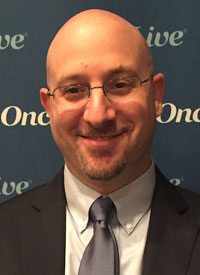 I recently wrote a blog called Neuroendocrine Cancer – Exciting Times Ahead! I wrote that on a day I was feeling particularly positive and at the time, I wanted to share that positivity with you. I genuinely believe there’s a lot of great things happening. Don’t get me wrong, there’s a lot still to be done, particularly in the area of diagnosis and quality of life after being diagnosed. However, this is a really great message from a well-known NET expert.
I recently wrote a blog called Neuroendocrine Cancer – Exciting Times Ahead! I wrote that on a day I was feeling particularly positive and at the time, I wanted to share that positivity with you. I genuinely believe there’s a lot of great things happening. Don’t get me wrong, there’s a lot still to be done, particularly in the area of diagnosis and quality of life after being diagnosed. However, this is a really great message from a well-known NET expert.
In an interview with OncLive, Jonathan R. Strosberg, MD, associate professor at the H. Lee Moffitt Cancer Center in Florida, discussed his presentation on NETs at a recent 2016 Symposium, and shed light on the progress that has been made in this treatment landscape.
Strosberg: The question I was asked to address is whether we’re making progress in the management of NETs, and I think the answer is unequivocally yes. Prior to 2009, there were no positive published phase III trials.
Since then, there have been 8 trials, 7 of which have reached their primary endpoints. So it’s been a decade of significant improvement. And even though none of these studies were powered to look at overall survival as an endpoint, we’re certainly seeing evidence of improvement in outcomes.
Strosberg: The first group is the somatostatin analogs. We use them to control hormonal symptoms like carcinoid syndrome, but with the CLARINET study, we now know that they substantially inhibit tumor growth.
The next significant drug we use in this disease is everolimus (Afinitor), an oral mTOR inhibitor, which is now approved in several indications based on positive phase III studies. The first was in pancreatic NETs and subsequently, based on the RADIANT-4 trial, it was also approved in lung and gastrointestinal NETs. So that was an important advance.
The next important category of treatment is radiolabeled somatostatin analogs, otherwise known as peptide receptor radiotherapy. The one that’s been tested in a phase III trial is lutetium dotatate, also known as Lutathera. It was tested in patients with progressive midgut NETs and showed a very substantial 79% improvement in progression-free survival, and a very strong trend toward improvement in overall survival, which we hope will be confirmed upon final analysis.
Strosberg: Certainly. I think pathologists are better at making the diagnosis of a NET, rather than just calling a cancer pancreatic cancer or colorectal cancer. They’re recognizing the neuroendocrine aspects of the disease, and doing the appropriate immunohistochemical staining.
We also have better diagnostic tools. We used to rely primarily on octreoscan, and in many cases we still do, but there is a new diagnostic scan called Gallium-68 dotatate scan, also known as Netspot, which has substantially improved sensitivity and specificity. It’s not yet widely available, but it is FDA approved and hopefully will enable better diagnosis as well as staging in the coming years.
And, with the increase in number of phase III studies, we’re developing evidence-based guidelines, which will hopefully lead to more standardization, although knowing how to sequence these new drugs is still quite challenging.
Strosberg: If we take, for example, NETs of the midgut, beyond first-line somatostatin analogs, physicians and patients often face decisions regarding where to proceed next, and for some patients with liver-dominant disease, liver-directed therapies are still an option.
For others, everolimus is a systemic option, and then hopefully lutetium dotatate will be an option based on approval of the drug, which is currently pending. Knowing how to choose among those 3 options is going to be a challenge, and I think there will be debates. Hopefully, clinical trials that compare one agent to another can help doctors make that choice. It’s even more complicated for pancreatic NETs. Beyond somatostatin analogs, we have about 5 choices—we have everolimus, sunitinib (Sutent), cytotoxic chemotherapy, liver-directed therapy, and peptide receptor radiotherapy. It’s even more challenging in that area.
Strosberg: There’s a trial that is slated to take place in Europe which will compare lutetium dotatate with everolimus in advanced pancreatic NETs, and I think that’s going to be a very important trial that will help us get some information on both sequencing of these drugs, as well as the efficacy of Lutathera in the pancreatic NET population, based on well-run prospective clinical trials. I’m particularly looking forward to that trial.
Strosberg: One area of particular need is poorly differentiated neuroendocrine carcinomas. That’s a field that’s traditionally been understudied. There have been very few prospective clinical trials looking at this particular population, and we’re hoping that will change in the near future. There are a number of trials taking place looking at immunotherapy drugs. If these agents work anywhere in the neuroendocrine sphere, they are more likely to work in poorly differentiated or high-grade tumors, in my opinion, given the mutational profile of these cancers. So that’s something I’m particularly looking forward to being able to offer these patients something other than the cisplatin/etoposide combination that goes back decades, and is of short-lasting duration.
Thanks for reading
Ronny
Hey Guys, I’m also active on Facebook. Like my page for even more news.
My Diagnosis and Treatment History
Sign up for my twitter newsletter

Whatever cancer throws your way, we’re right there with you.
We’re here to provide physical, financial and emotional support.
© Macmillan Cancer Support 2024 © Macmillan Cancer Support, registered charity in England and Wales (261017), Scotland (SC039907) and the Isle of Man (604). Also operating in Northern Ireland. A company limited by guarantee, registered in England and Wales company number 2400969. Isle of Man company number 4694F. Registered office: 3rd Floor, Bronze Building, The Forge, 105 Sumner Street, London, SE1 9HZ. VAT no: 668265007